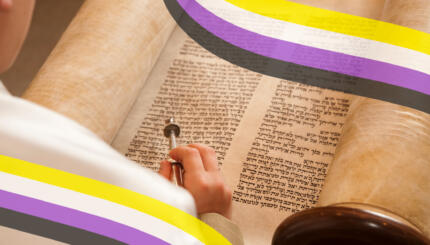Celebrating a bar or bat mitzvah is a unique and special time in the life of a child, family and community. Having experienced it personally (30 years ago!), as a father and as a congregational rabbi, I can attest to the transformative power of the ritual. The ability to recognize and celebrate a child as they enter into their teenage years, the ability for parents to see their child growing and maturing, and the ability of a community to see one whom they have nurtured come into their own, is very powerful.
We naturally want to praise our kids at these sacred occasions, and one of the most moving parts of the bar or bat mitzvah ceremony to me is when we—congregational leaders, teachers, parents—are able to speak publicly about and to the Bar or Bat Mitzvah.
There is one phrase that we commonly use, however, that gives me pause, and one that I think we should refrain from using when speaking to our youth at these times: “you did a great job.”
While bar or bat mitzvah requirements will vary from congregation to congregation, community to community, the ceremony usually takes place in the context of a Shabbat service and will usually involve the Bar or Bat Mitzvah demonstrating a combination of Torah and/or haftarah reading, prayer leading, community service and delivering a d’var Torah (a teaching on the Torah portion.) And while these are learned skills, when we say “you did a great job” we are reinforcing the idea that the bar or bat mitzvah ceremony is primarily a performative act, and that the meaning of the day comes from how well the child was able to master the particular skills we ask them to do. (And that we judge our students against an objective standard and against each other.)
While we want our kids to have the skills they need to be able to live fully Jewish lives, does the quality of their Jewish life depend on how well they master those skills? Skills are measurable, but when does a spiritual life only embody measurable skills? With secular education we push back when students are ranked and rated solely on standardized assessment tests, arguing that they don’t represent the whole child. Why should Jewish life be any different?
Or even more so: spirituality is perhaps by definition immeasurable. How do we measure a sense of awe at the power and scope of the universe and the natural world surrounding us? How do we measure deep feelings of gratitude? How do we measure the ability to be inspired and challenged by sacred text and to formulate new thoughts and ideas in response to it? How do we measure compassion or generosity of spirit? How do we measure having a sense of the divine, that we are part of something greater than ourselves?
Indeed, these are the ideas we want to cultivate in our youth in order to live full Jewish adult lives, so maybe the traditional “skills” we focus on are the wrong ones, or at least we give too much attention to them.
There are lots of things we can say to our kids at the moment of their bar or bat mitzvah ceremony without focusing on how well they may have chanted their Torah portion. We can say, “I’m proud of your accomplishment”—recognizing that setting out and completing a task is in and of itself worthy of praise. We can say, “Thank you for your dedication and commitment” —recognizing that the growth comes in the process, not just in the end result. We can focus on who they are, rather than what they did.
All this is to say as well that we may need to reassess what bar or bat mitzvah means. We may need to reassess what we expect of our children in celebrating this milestone, so that we can focus on developing our children’s whole spiritual lives. And in that way they will know, and we will know, that, in their own way, they all do a good job.
bat mitzvah
Pronounced: baht MITZ-vuh, also bahs MITZ-vuh and baht meetz-VAH, Origin: Hebrew, Jewish rite of passage for a girl, observed at age 12 or 13.
mitzvah
Pronounced: MITZ-vuh or meetz-VAH, Origin: Hebrew, commandment, also used to mean good deed.
Shabbat
Pronounced: shuh-BAHT or shah-BAHT, Origin: Hebrew, the Sabbath, from sundown Friday to sundown Saturday.
Torah
Pronunced: TORE-uh, Origin: Hebrew, the Five Books of Moses.



